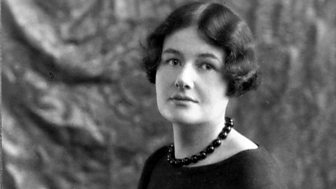Rebecca Clarke
The composer Rebecca Clarke was born and raised in England, with a German mother and an American father.

| Image source |
| Rebecca Clarke (27 August 1886 - 13 October 1979) |
As well as being a composer, she was a highly regarded violist and contributed greatly to the viola repertoire, including a piece called "Morpheus". Morpheus is a god associated with sleep and dreams. In Ovid's Metamorphoses he is the son of Sleep, and he appears in dreams in human form.
Listen to this entrancing piece:
Clarke enrolled at the Royal Academy of Music in 1903, where she studied the violin. She was abruptly withdrawn from the institution in 1905, when her harmony teacher, Percy Miles, proposed marriage. In 1907 she began a composition course at the Royal College of Music, where she was Stanford's first female student. Again, she was unable to finish her studies, as her habitually cruel father suddenly banished her from the family home. To support herself, Clarke embarked on an active performing career as a violist, and in 1912 she became one of the first female musicians in a fully professional (and formerly male) ensemble, when Henry Wood admitted her to the Queen's Hall orchestra.
In 1916 she began a US residency. With cellist May Mukle, she performed extensively in Hawaii and on a round-the-world tour of the British colonies in 1923. Rebecca Clarke achieved what she called
"my one little whiff of success"
in 1919, when her Viola Sonata tied for first place in a competition sponsored by Elizabeth Sprague Coolidge (listen to it here). Although she wrote nearly 100 works (including songs, choral works, chamber pieces and music for solo piano), only 20 pieces were published in her lifetime.
Listen to one of her favourite compositions, "The Seal Man":
Clarke settled in London in 1924, where she performed as a soloist and ensemble player with musicians including Myra Hess, Adila Fachiri and Mukle. Clarke also performed as a soloist and ensemble musician in BBC broadcasts, and made several recordings.
| Image source |
With the onset of World War II, Clarke found herself in the USA, where she lived alternately with her two brothers and their families. Her creative productivity ended when she accepted a position as a nanny in 1942. In the early 1940s Clarke became reacquainted with James Friskin, a member of the piano department at the Julliard School, whom she had first known as a student at the Royal College of Music in London. The couple married in 1944.
This blog is intended to be educational and to share knowledge about music. Daily Hit of Music does not claim to own anything contained in this post and declares its sources openly.
The following sources were used for this blog post: rebeccaclarke.org, Wikipedia
Image sources can be found in the image captions.
Recordings can be found on YouTube by clicking the 'DHM YouTube Playlist' links.
Comments
Post a Comment